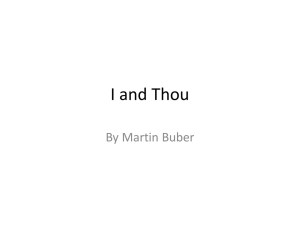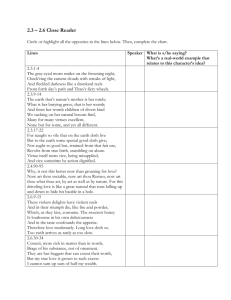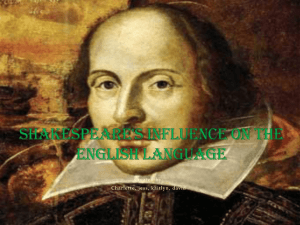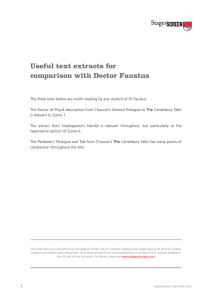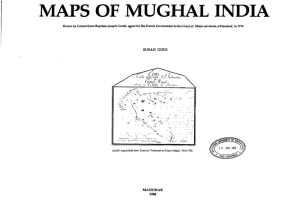Chaucer*s Grammar
advertisement
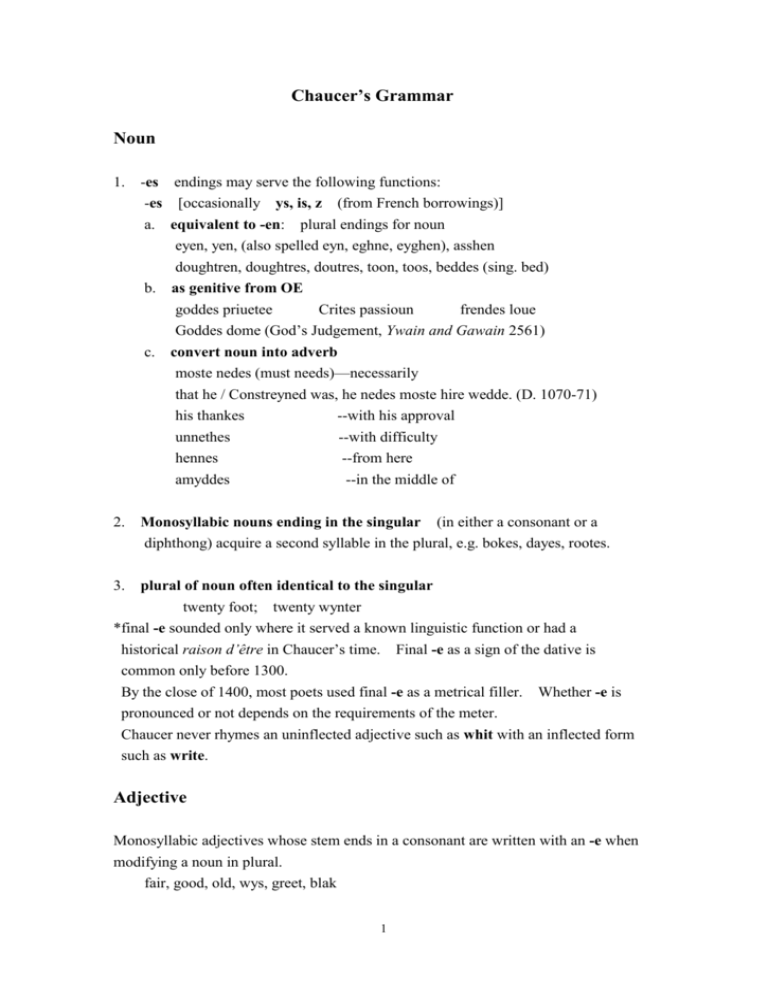
Chaucer’s Grammar Noun 1. -es endings may serve the following functions: -es [occasionally ys, is, z (from French borrowings)] a. equivalent to -en: plural endings for noun eyen, yen, (also spelled eyn, eghne, eyghen), asshen doughtren, doughtres, doutres, toon, toos, beddes (sing. bed) b. as genitive from OE goddes priuetee Crites passioun frendes loue Goddes dome (God’s Judgement, Ywain and Gawain 2561) c. convert noun into adverb moste nedes (must needs)—necessarily that he / Constreyned was, he nedes moste hire wedde. (D. 1070-71) his thankes --with his approval unnethes --with difficulty hennes --from here amyddes --in the middle of 2. Monosyllabic nouns ending in the singular (in either a consonant or a diphthong) acquire a second syllable in the plural, e.g. bokes, dayes, rootes. 3. plural of noun often identical to the singular twenty foot; twenty wynter *final -e sounded only where it served a known linguistic function or had a historical raison d’être in Chaucer’s time. Final -e as a sign of the dative is common only before 1300. By the close of 1400, most poets used final -e as a metrical filler. Whether -e is pronounced or not depends on the requirements of the meter. Chaucer never rhymes an uninflected adjective such as whit with an inflected form such as write. Adjective Monosyllabic adjectives whose stem ends in a consonant are written with an -e when modifying a noun in plural. fair, good, old, wys, greet, blak 1 e.g. fresshe floures white and reede nose-thirles blake weere and wyde Adjective: when preceded by definite article the, demonstrative this, that, thilke, a possessive pronoun and possessive genitive noun, the final -e is used. Definite Indefinite Plural the goode hors a good hors goode hors this olde man an old man olde bookes this yonge wyf a yong wyf yonge wyues my longe tale smal coral smale foweles Most adjectives form their comparatives in -er; a few without: bet (better), leng (longer), nere (near) also betere (Havelok) Superlatives are usually formed in -est, -ost. Taak hym for the grettest gentil man (WB D.1116) Chaucer’s grammar is conservative, matched with that of the country areas around the capital. Noun-adjective concord marking plural by use of final -s. French-derived adjective--mostly in technical language. places delitables tables tolletanes Pronoun 1st person 2nd person nom. sg. I, Ich, Ic, Ik thow, thou nom. pl. we ye accus. sg. me the(e) accus. pl. us yow~you poss. sg. my(n), myne thy(n) poss. pl. oure youre *superior addresses to inferior--thou 3rd person she, he, hit thei, they hire, him, (h)it hem hire, his hire, thair inferior addresses to superior--ye, in Havelok (?) Godrich to goldebow (To-morwe sholen ye ben weddeth) (1128) The relatives: that, which, which that may be used for both persons and things. Pronouns sometimes attached to the verb shaltu (shalt thou) yeuenet (given it) willi (I will) woldestow (would you) The 2nd per. pl. is often used for the singular in formal speech. My and thy take an n before a word beginning with a vowel or h: thyne oth, myn herte. 2 Verb 2nd sing: -(e)st – Frankeleyn! pardee, sire, wel thou woost (F 696) -(e)th – e.g. Thy gentillesse cometh fro God allone. (WB D 1162) He lyveth helplees and al desolat. (E 1321) 3rd pl. -(e)n, -e – That shapen hem this citee for to wynne. (F 214) (who [them] contrive to win this city] And up they risen, wel a ten or twelve (F 383) Strong verb--change in the root vowel (e.g. binden, band, bunden) 3rd sing: Infintive quoth Preterite quath, quod Past knowe(n) take(n) breke(n) spring (sprynge) stonde(n) speke(n) gete(n) fille knewtok-~tookbraksprong (sproong) stod-~stoodspakegat (got) filde knowe(n) take(n) broke(n) yspronge falle Participle stonde(n) spoke(n) geten filde felle feollen Weak verb preterite / p.p. addition of -(e)d or -t as suffix wedde(n) wedded wedded seke(n) soghtsoght werke(n) wroghtwroght wende(n) went went *sometimes special preterite may be due to phonetic factors in prehistoric past Weak verbs most common then as now; new coinage/foreign borrowings treated as weak verbs daunce(n) daunced daunced crepe(n) crept-~creep- crept~cropen (originally a strong OE verb but became weak) Infinitives Infinitives with or without final n; may end in e(n), i(n) 3 Plain infinitives without preceding preposition--commonest form Other infinitives--to, for precede the verb 1. Infinitive used in passive sense: remembryng him his errand was to doone. (TC II. 72) ...was demed for to hange upon a tree (C 270-1) 2. fulfills a function more often discharged by the p.p. in modern English. he cam *ride---he came riding *originally adverb-function qualifying the verb 3. Omission of the infinitive of verbs of motion, common ME idiom. She wol nat dwelle in house half a day But forth she wole er any day be dawed (D 352-3) When used to address to two or more recipients, the imperative usually ends in -eth, also frequently is endingless. With long swerd and with mace fighteth your fille. Go now youre wey. (A 2559-60) Taketh the moralitee, goode men. (B 4630) In addressing singular indicative -eth inflexion is usually used in the context of ye endingless form in the context of thou Now telleth ye, sire monk, of that ye konne (A 3118) That therfore sholden ye be gentil men (WB D.1111) And also thynk and ther with glade the (TC I. 897) *Progressive forms are infrequent. Chaucer often uses present form to refer to past time. Past participle Weak verbs ending in -ed, -t Strong verbs ending in -(e)n, after loss of n, in e alone Strong and weak forms may be marked by prefix yEast Midlands Southern English Strong comen ycome Weak clept, nempned yclept, inempned Chaucer’s come(n) clept, nempned ycome(n) yclept, ynempned 3rd person singular preterite -eth ending, but also in -t, particularly with verbs whose stem ends in t, d. fint findeth bint bindeth rit rideth 4 Adverb many adverbs are formed by the suffixes -ly, -liche, but more frequently they are formed by addition of -e to the stem of adj. Thurghout the citee by the maister streete That sprad was al with blak and wonder hye (adv.) Right of the same is the strete ywrye (p.p.) (A 2902-2904) Whan set was Theseus ful ryche and hye (A2577) (adv.) (adv.) Grante me grace to lyven vertuously (D 1174) Tense Present and Past future by use of present, made unambiguous by context and adverbials periphrastic form with the auxiliaries shal, wol, wil followed by an infinitive. That er she come it wol neigh euen be (TC V 1137) Oure maunciple, I hope he wol be deed (A 4029) (hope: expect, believe) Farewel, my child, I shal thee neuere see (E 555) for to = to [And palmeres for to seken straunge strondes (I. 12-13)] *Chaucer uses variation forms of grammar to suit his metrical purpose, e.g., use of the present tense in past contexts. periphrasis--use of many words where one is sufficient gan--periphrasis, e.g., gan to rynge, semantically equivalent to a preterite, but strong sense of progression; for versification purposes riden (when in preterite, serves present) and right-anoon withouten moore abood His baner he desplayeth and forth rood (preterite to suit the rhyme) (not compatible) To Thebesward. (A 965-7) progressive tense infrequent simple form may be used: ye goon to Canterbury (you are going . . .I. 769) simple negative: I kan nat seye, but swich a greet corage (E.1254) Negation 5 a. ne+V+no+complement When complement begins with a vowel or with initial h, noon is used in place of no But wedded men ne knowe no meesure (E 622) I wol noon oold wyf han in no manere. (E 1416) O Donegild, I ne have noon English digne (B 778) Ne shal it me nouth dere (Havelok 807) (It shall not harm me) Ne none kines oÞer wede (Havelok 862) (No other kinds of clothes) b. ne+V+nat~noght [nat(earlier form); noght(Northerly form) features of London language of the period] So that the wolf ne made it nat myscarie (Prol. 513) more noght emphatic--not than Hise hors weere goode, but he ne was nat gay (A 74) Ne studieth noght. Ley hond to, euery man. (A841) c. ne+N.+ne Ne me ne list this sely womman chyde (TC V.1093) Ne of his speche daungerous ne digne (Prol. 517) (including entire clause) double negation is common = single negation (not certain if appled to entire clause, (in formal prose) or only a determiner of a noun.) He saw nat that (A 3461) Ne was ther swich another pardoner (A 693) ‘It were to thee.’ quod he, ‘no greet honour.’ (A 1129) no. . . wiht = no. . . thing no--not an adverb, but a negative form of the determiner an For half so boldely kan ther no man Swere and lye as a womman kan (D 227-228) I am a gentil womman and no wenche (E 2202) sometimes none = noght as treated by scribes Yet hadde I nevere with noon of hem debaat (E 1496) And blosmy tree nys neither drye ne deed (E 1463) not to be not to have not to wish(will not) not to know I nam 6 negate the thow nart thow nilt nost(ow) entire he nys he nath he nyl he niste predicate he nas he nadde he nolde he not of the clause it nere development of emphasis nat--> noght--> no thing; no wight; nowhere; nevere; namore multiple negation to impart vehemence and gravity (high style) And heere I swere that neuere willyngly In werk ne thoght I nel yow disobeye For to be deed, thogh one were looth to deye (E 362-364) suffix -lees prefix ununnethes, unable, unapt, unkonnynge nam but -- only; no more than; nothing other than Dialectal variation (phonological variants) Midlands i, south-eastern e, West Midlands u myrie mury mery synne senne fille felle thynne thenne knitte knette stynt stente fyr feere triste truste liste kisse thynke leste kesse thenche abye abeye abegge kyn ken kille quelle Subjunctive in main clause (1) (2) (3) may express wish God yelde yow (May God reward you. III. 2177) imperative in 1st person go we se concession Bityde what bityde (VII. 874) Be as be may. In independent clause--concerned with condition / hypothesis if gold ruste (I. 500) if thou telle it (I. 3505) if so be/were Contractions 7 (1) The pronoun thou often becomes enclitic with the verb in questions and imperatives shaltu (you shall) wostow (knowest thou) wurstu (be thou) slepestu (sleepest thou) wiltu (wilt thou) (2) The word ne, not, is often combined with the following verbs if it begins with a vowel or h- or w-, and the final -e disappears not (ne wot, knew not) nastu (ne hast thou) nyl(l) (ne wyl, will not, do not wish to) nyste (ne wiste, did not know) nys (ne ys, is not) nost (ne wost, you know not) not, noote (ne wot, woot, I (he) know(s) not, do(es) know) (3) Before vowels, -e of the definite article is sometimes elided: Þerl (the earl) Þ (thorn) th u is equivalent to v, w i is equal to y 3 (yogh) gh/y tvo (=two) ð (eth) th th is equal to t sound (hence Sathanas = Satan) || n || ||| ---> upright strokes called minims u m im mu in minims could be confusing scribes often use y to replace i in minims Middle English spellings are either phonetic (as in hwat) or much the same as in modern English. Exceptions include qu-, qw-, for wh- (quat, what) -th for -ht (rith, riht) There may have the prefixing of an unnecessary h- (habide, await) (helde, old) (hete, eat) (hit, it) or the omission of h- where needed (wat, what). Word Order 1. attributive adjective may be placed after the N a、 The laughter aros of gentil foules alle (PF 575) 8 (Laughter arose among all noble birds) 2. 3. 4. 5. 6. b、 Kyng Pandiones fayre doughter dere (Legend of Good Women 2247) (King Pandion’s beautiful beloved daughter) Subject of sentence follows prep-phrase (V-Subj.) a、 .... by aventure yfalle In felaweshipe, and pilgrimes were they alle (Prol. 25-26) (They were all pilgrims, by chance in fellowship . . . ) b、 Of latter date, of wyves hath he red That somme han slayn hir housbondes in hir bed (WB D 765-66) c、 Agayns his doghter hastily goth he . . . (Clerk E 911) Subject placed after the V. A trewe swynkere and a good was he (Prol. 531) Reverse order of there was/were a、 A knyght ther was, and that a worthy man (Prol. 43) b、 A Clerk ther was of Oxenford also (Prol. 285) c、 A good man was ther of religioun (Prol. 477) d、 A millere was ther dwellynge many a day (Reeve’s A 3925) Obj.-Verb—second position Of his falsnesse it dulleth me to ryme (Canon’s Yeoman G 1093) Obj.-V formation a、 b、 c、 d、 7. Us moste putte oure good in aventure (Canon’s Yeoman G 946) The foule feend hym fecche! (G 1159) I yow rede (I advise you) (G 1008) I yow preye (G 1010) cf. Ful hertely I pray yow telle us part. (E. 1242) e、 For in tokenyng I thee love. (G 1153) f、 That no man us espie, / whils that we werke in this philosophie. (G 1138-39) Wh-question with NP or predicate following a、 Initial position: What sholde I yow reherce in special / Hir hye malice? (E 1221-22) b、 Median position: I nam but deed, but if that I kan seyn / What thyng it is that women moost desire. (D 1006-07) c、 Thanne wolde I shewe yow how that I koude pleyne For Chauntecleres drede and for his peyne. (B 3354-55) (Then I would show you how I could lament for Chaunteclere in fear and in pain) d、 That is to seyn, what is Contricioun, and whiche been the causes that sholde be contrit, and what Contricioun availeth to the soule. (I. 127) 9 e、 Herestow not what they prayen us? (HF 1862) 8. 9. (Have you not heard what they beseech us?) to-Infinitive referring to future event To teche hem vertu looke that ye ne slake. (Physician C 82) Ful lief were me this conseil for to hyde. (Shipman’s B 1349) This provost dooth these Jewes for to sterve (B 1819) perfect tense in dependent clause: Now sith that so is that ye han understonde what is Pride (I 474) (Now since it is so that you have understood what Pride is) 10

